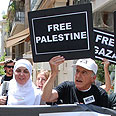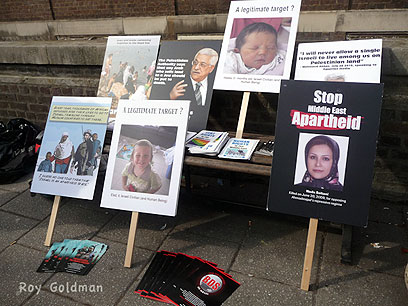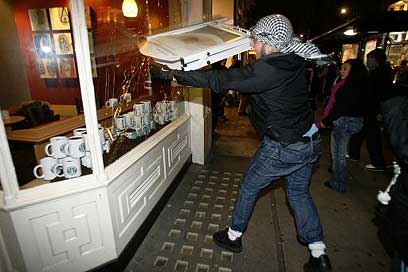
Israeli Apartheid Week marked in US campuses
Pro-Palestinian campaign, marked in European universities last week, arrives in US. CEO of pro-Israeli organization says there is hostile environment toward Israel in 60-80 out of 4000 American universities
WASHINGTON – The Israel Apartheid Week, a pro-Palestinian international campaign which includes films, lectures, demonstrations and calls for a boycott of Israel, commenced in US campuses on Sunday. The anti-Israel event was initiated in Europe eight years ago. This year's event will last six days in the US and then move to Canada.
Related Stories:
- Canada store owner defeats anti-Israel boycotters
- Op-ed: Fighting campus hatred
- Court: No anti-Semitism in UC Berkeley
Contrary to alarming headlines in local media, US students are not as troubled by Apartheid Week events as it would seem. A survey among American students reveals that 80% are in fact not interested in the Israeli-Palestinian conflict. The survey also indicates that 15% students are pro-Israeli compared with only 5% of students who are pro-Palestinian.
In fact, many students regard Apartheid Week with its rallies and "checkpoints" as mainly annoying. Out of roughly 4,000 campuses in the US, almost all do not have an anti-Israel atmosphere. Only a few dozen campuses hold a prominent debate on the issue.
Israel's Foreign Ministry assists some 10 Jewish and non-Jewish organizations in their efforts to promote a pro-Israel discourse in these campuses. One of them is the the David Project, which was founded in Boston in 2002 during the Al-Aqsa Intifada. The organization aims to promote the idea that Israel plays the part of "David," of the David and Goliath story, in the Israeli-Palestinian conflict.

Pro-Israeli demonstrations in England (Photo: Roi Goldman)
In a new report on the state of anti-Israel sentiment in the campuses, the David Project determines there is anti-Israel hostility in 60-80 US campuses, mainly in art programs. These colleges don't necessarily have a hostile environment for Jewish students, but there is a spillover effect of anti-Israeli opinions, especially among student leadership that are dangerous in the long-run.
"The main challenge is not to stop de-legitimization, but to prevent it from rising in the first place", said Executive Director David Bernstein.
Bernstein says a real problem exists only in 15-20 small colleges, most of which are schools for the arts. Some of these establishments have Middle East programs, often funded by Gulf countries, and led by radical leftist activists. These campuses have an overall anti-American atmosphere which also works against Israel, the report said.

Anti-Israeli riots in UK (Photo: Reuters)
The David Project report also found that in many cases the anti-Israel sentiment is not particularly strong, as it is widespread, because students don't hold firm opinions. The report also found that anti-Israel opinions are not directed against Jewish students in particular. "Campuses are not filled with hatred for Jews, and are still very pro-Israel," Bernstein noted.
"The confrontations are not good for Israel," he explained. In previous years, pro-Israel organizations faced the anti-Israel activities head-on. These confrontations did not benefit the Israeli case, but only served to create more headlines for the anti-Israel propaganda, Bernstein claims. The David Project adopted a different approach of engaging key groups in campuses to advocate the Israeli stand.
For example, the project identified a problem in the University of Pennsylvania, and responded by organizing a "welcome Shabbat reception" (Kabalat Shabbat) with non-Jewish students. In other places, activists invited students for coffee to discuss the issues. Similar activities were initiated in the University of California, Irvine, where Israeli Ambassador Michael Oren was interrupted by students who heckled him raucously during his address.
The David Project also offers students with leadership potential to take part in special seminars in Washington and in Israel.
- Receive Ynetnews updates directly to your desktop










